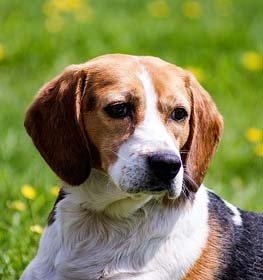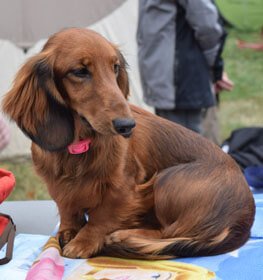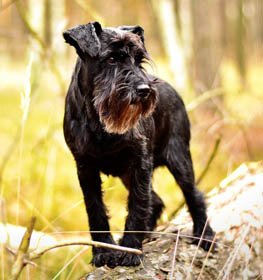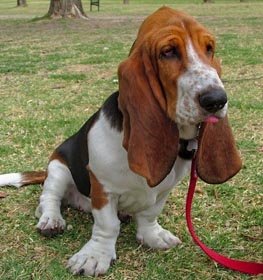Danish-Swedish Farmdog Information & Dog Breed Facts
Collection of all the general dog breed info about Danish-Swedish Farmdog so you can get to know the breed more.
| Group | Hunting Dogs |
|---|---|
| Popularity Rank | 300 |
| Reviews | 1 |
| User Ratings | |
|
Compare the Danish-Swedish Farmdog With Other Dogs
Select at least one dog breed to make the comparsion. | |
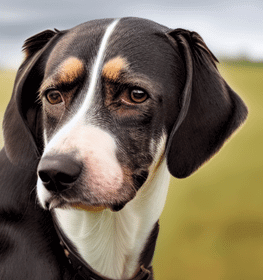 | |
| Origin | |
|
Common Names & Aliases
What other names is a Danish-Swedish Farmdog known by? Discover all traditional, regional and informal names used for this breed. | Dansk-svensk gårdshundScanian Terrier |
|---|---|
|
Breed Classification
What type of dog breed is a Danish-Swedish Farmdog? Learn about its genetic classification and breeding category. | Purebred |
|
Size Classification
What size category is a Danish-Swedish Farmdog? Learn how big the Danish-Swedish Farmdog breed typically grows. | Small |
|---|---|
|
Weight Statistics
How much does a Danish-Swedish Farmdog weigh? Discover typical weight ranges for adult males and females of the Danish-Swedish Farmdog breed. | 15-25 pounds (7-12 kg) |
|
Average Weight
What is the average weight of a Danish-Swedish Farmdog? | 20 pounds (9.5 kg) |
|
Height
How tall is the Danish-Swedish Farmdog? Danish-Swedish Farmdog height: | Male: 13–15 inches (32–39 cm), Female: 12–15 inches (30–37 cm) |
|
Average Height
What is the average height of a Danish-Swedish Farmdog? | Male: 13–15 inches (32–39 cm), Female: 12–15 inches (30–37 cm) |
|
Price Range
How much does a Danish-Swedish Farmdog puppy cost? Find current market prices and factors affecting Danish-Swedish Farmdog costs. | $600-$800 If you choose to purchase the Danish-Swedish Farmdog, you should know that the mentioned amount of money is an average of the collected data from breeders’ sites and puppy finder places. If you have a Danish-Swedish Farmdog for sale, please advertise it on a reliable website to make sure the Danish-Swedish Farmdog gets to a happy place. |
|---|---|
|
Availability
How easy is it to get a Danish-Swedish Farmdog? How many Danish-Swedish Farmdog are there in the world? | Average: The Danish-Swedish Farmdog is a commonly available dog breed. There is less risk of overbreeding compared to the very popular dogs. Of course, they may be more popular in some countries, and inbreeding may occur, so be careful. |
|
Intelligence Rating
How intelligent is a Danish-Swedish Farmdog? Discover the Danish-Swedish Farmdog's intelligence ranking and learning capabilities. | Average: It takes patience to teach this breed any tricks or commands, but the effort is worth it. They understand and remember new commands after an average of 25-40 repetitions.
The Danish-Swedish Farmdog ranks average in the intelligence ranking of dogs. |
|---|---|
|
Training Difficulty
How easy is it to train a Danish-Swedish Farmdog? Learn about the Danish-Swedish Farmdog's trainability and response to training methods. | Danish-Swedish Farmdog dogs are quite easy to train. Sometimes they can be challenging, but if you're consistent in teaching new commands they will obey for sure. |
|
Watchdog Rating
How good is a Danish-Swedish Farmdog as a watchdog? Learn about the Danish-Swedish Farmdog's alertness and guarding instincts. | Danish-Swedish Farmdog dogs are average watchdogs. If they sense something different, they will alert you, but observation isn't considered their main job.
|
|
Territorial Protection
Is a Danish-Swedish Farmdog protective of its territory? Learn about the Danish-Swedish Farmdog's guarding instincts and behavior. | Danish-Swedish Farmdog dogs are extremely protective guard dogs. This breed doesn't hesitate to protect its territory so the Danish-Swedish Farmdog can be a good choice if you want an excellent guard dog. Keep calm and the Danish-Swedish Farmdog will take care of unwanted people or animals. |
|
Personality Traits
What personality does a Danish-Swedish Farmdog have? Learn about characteristic Danish-Swedish Farmdog temperament and behavior traits. | AlertIntelligentLivelyAttentive |
|---|---|
|
Sensitivity Level
How sensitive are they? Danish-Swedish Farmdog sensitivity: | Danish-Swedish Farmdog dogs have an average emotional level and are not the most sensitive dog breed. Sometimes it's okay to change the daily routine, have guests and listen to loud music.
Some dogs handle moderate punishment very well, while others crumble apart at a dirty look. This breed is not affected emotionally by moderate punishment. |
|
Affection Level
How affectionate are they? Is a Danish-Swedish Farmdog a good family dog? | High: Danish-Swedish Farmdog dogs are genuinely loyal, soft and gentle, loving, and affectionate dogs toward their handlers. They enjoy quality time with their owners despite the activity and are considered great therapy dogs for those in need. This breed responds strongly to their handler's emotions because they bond closely. Their happiness is your happiness. |
|
Social Needs
How much social interaction does the Dansk-svensk gårdshund need? Danish-Swedish Farmdog social needs: | Danish-Swedish Farmdog dogs need a lot of social interaction. They desire to always be with someone or around people. This breed hates being left alone. |
|
Impulse to Wander or Roam
How likely is the Danish-Swedish Farmdog to run away? Does this breed explore or wander a lot? Does Danish-Swedish Farmdog roam? | Danish-Swedish Farmdog dogs have average wanderlust potential. Sometimes they like to explore the world and they might escape once or twice, but usually, they prefer staying safely at home. Safer to teach them how to get back to you on command. |
|
Prey Drive
Do this canine have a strong prey drive? Does Danish-Swedish Farmdog have high prey drive? | Danish-Swedish Farmdog dogs have an average prey drive, which means that they don't have a high impulse to chase and catch something like a cat or any other small aminals, but it might happen. Training can help to achieve good behavior. |
|
Barking Frequency
Does a Danish-Swedish Farmdog bark a lot? Learn about typical Danish-Swedish Farmdog vocalization patterns and triggers. | Average to High: The Danish-Swedish Farmdog is a vocal breed. Not the best choice if you prefer a quiet breed. They often bark loudly and howl sometimes. They can change their barks depending on their emotional level and what they're trying to say. Different barks could mean the same and the same barks could have different meanings.
Top reasons for barking: protection, alarm, fear, boredom, attention-seeking, greeting, separation anxiety, compulsive barking. |
|---|---|
|
Playful Nature
How playful is a Danish-Swedish Farmdog? Understand the typical play drive and energy level of the Danish-Swedish Farmdog breed. | The Danish-Swedish Farmdog is a playful breed. Excited barking and sometimes nipping will alert you to play. |
|
Apartment Adaptability
Can a Danish-Swedish Farmdog live in an apartment? Learn about the Danish-Swedish Farmdog's suitability for apartment living. | Very house-friendly dog the Danish-Swedish Farmdog breed. It's good if you have a small garden where he can go out and do his business, but it's not important at all. You can get enough exercise with one or two walks a day, so keeping them indoors shouldn't be a problem. |
|
Lifestyle Adaptability
How adaptable is a Danish-Swedish Farmdog to lifestyle changes? Learn about the Danish-Swedish Farmdog's flexibility to new situations. | Danish-Swedish Farmdog dogs adapt very well to lifestyle changes and basically all living environments. They don't mind moving from one place to another with their owner. |
|---|---|
|
Alone Time Tolerance
Can a Danish-Swedish Farmdog be left alone? Learn about the Danish-Swedish Farmdog's tolerance to solitude. | Danish-Swedish Farmdog dogs tend to have separation anxiety when their owners left them alone at home because they bond very closely with them. |
|
Bite Risk Assessment
What is a Danish-Swedish Farmdog biting potential? Learn about the Danish-Swedish Farmdog's bite risk factors. | Low 🔽 The Danish-Swedish Farmdog has a low chance of biting somebody. Top reasons for dog bite: protection, pain, excitement, herding instinct, being provoked. (Data based on the available online bite statistics.) |
|---|---|
|
Mouthing Tendency
Is a Danish-Swedish Farmdog mouthy? Learn about the Danish-Swedish Farmdog's tendency to use mouth during play. | Danish-Swedish Farmdog dogs have a higher than average tendency to nip, chew, playbite, or herd people. It's a common habit during puppyhood, not aggressive behavior. These "bites" don't hurt, but Danish-Swedish Farmdog dogs need to be taught a good attitude. |
|
Bite Strength Rating
How strong is a Danish-Swedish Farmdog bite? Learn about the Danish-Swedish Farmdog's bite force measured in PSI. | Between 100 and 200 PSI 🔽 Danish-Swedish Farmdog bite force: Weak. The Danish-Swedish Farmdog bite force is considered weak when compared to other dog breeds. The bite force Danish-Swedish Farmdog measurements usually fall below 200 PSI, making them one of the breeds with the weakest bite force. The bite force of a Danish-Swedish Farmdog may be weak, but it's important to remember that any dog's bite can still be dangerous if not managed properly. Despite the bite force of Danish-Swedish Farmdog being lower, it does not make them any less lovable or enjoyable as pets.
Danish-Swedish Farmdog bite wounds might not be as severe, but it is still essential to be cautious and prevent any biting incidents. They are usually not aggressive and very friendly towards children and other animals. To ensure a well-behaved dog, it's essential to learn how to train a Danish-Swedish Farmdog puppy not to bite from an early age. With proper training and socialization, a Danish-Swedish Farmdog can be a wonderful addition to any family, providing love and companionship for years to come. |
|
Average Lifespan
How long does a Danish-Swedish Farmdog live? Learn about the typical lifespan of the Danish-Swedish Farmdog breed. | 9-15 years The average lifespan of Danish-Swedish Farmdog: 12 years |
|---|---|
|
Climate Tolerance
How well does a Danish-Swedish Farmdog handle different weather? Learn about the Danish-Swedish Farmdog's climate adaptability. | Tolerates warm and cold weather Dogs that tolerate hot and cold weather are typically those that have a double coat of fur. Dogs with a double coat of fur have a layer of fur that insulates their skin and helps protect them from the cold and the heat. |
|
Health Concerns
What health issues are common in a Danish-Swedish Farmdog? Discover typical conditions affecting the Danish-Swedish Farmdog breed. | Danish-Swedish Farmdogs tend to have more frequent health issues than other breeds. Regular vet check-ups are needed.
|
|
Vet Care Frequency
How often does a Danish-Swedish Farmdog need vet visits? Learn about the Danish-Swedish Farmdog's veterinary care requirements. | Frequent The Danish-Swedish Farmdog should have a complete physical check-up at least once (but preferably twice) per year. If your dog shows any symptoms, call your veterinarian. |
|
Health Problems
What genetic/health problems does the Danish-Swedish Farmdog breed have? What are the health issues and concerns of the Danish-Swedish Farmdog breed? Most common health risks of Danish-Swedish Farmdog: | Hip Dysplasia Patellar LuxationDental Problems |
|
Energy Rating
How energetic is a Danish-Swedish Farmdog? Understand daily activity needs of the Danish-Swedish Farmdog breed. | Danish-Swedish Farmdog dogs have an average energy level, so if you live a semi-active life, this breed can be a good choice for you. |
|---|---|
|
Activity Requirement / Exercise Need
How much exercise does a Danish-Swedish Farmdog need? How much exercise do Danish-Swedish Farmdog dogs require per day?
Do Danish-Swedish Farmdog dogs need a lot of exercises? | Danish-Swedish Farmdog dogs have an average exercise need. This breed is satisfied with short walks every weekday and a long ones on weekends. |
|
Sleeping Need
How much sleep does the Danish-Swedish Farmdog breed need? | Danish-Swedish Farmdog dogs sleep 12-14 hours a day as an average dog and they're not considered a lazy breed. |
|
Obesity Tendency
Is a Danish-Swedish Farmdog prone to weight gain? Learn about the Danish-Swedish Farmdog's obesity risks. | Low to Average: The Danish-Swedish Farmdog has a low to the average risk for obesity. To make your dog happy and fit, feed him with quality dry dog food and live an active life together. Try to find the happy medium between exercise and feeding.
If you notice any weight gain, consult your veterinarian and make a diet plan. Reduce unhealthy food and snacks, and measure the Danish-Swedish Farmdog weight regularly. |
|---|---|
|
Food Consumption
How much food does a Danish-Swedish Farmdog need daily? Learn about the Danish-Swedish Farmdog's feeding requirements. | 1 to 1.5 cups of high-quality dry food a day, divided into two meals. |
|
Allergy Friendliness
Is a Danish-Swedish Farmdog hypoallergenic? Learn about the Danish-Swedish Farmdog's suitability for allergy sufferers. | No Danish-Swedish Farmdog dogs don't do well with allergy sufferers by causing allergic reactions. Some dog breeds are even considered to higher possibility of an allergic response. Coat type isn't necessarily relevant, because most people are allergic to dander (flakes on the dog's skin) or saliva, not actually to dog hair. |
|---|---|
|
Coat Colors
What colors does a Danish-Swedish Farmdog come in? Discover all possible Danish-Swedish Farmdog color variations. | Black White Brown |
|
Grooming Requirements
How much grooming does a Danish-Swedish Farmdog need? Learn about Danish-Swedish Farmdog coat maintenance requirements. | Easy to groom: The Danish-Swedish Farmdog doesn't require a lot of grooming. Seasonal flea treatment is needed, but cutting the dog's hair by a professional groomer isn't necessary. Ears and eyes should be cleaned regularly to avoid infections. Danish-Swedish Farmdog is a good choice if you don't have the time, skill, or money to take care of a high-maintenance dog. Recommended for beginners. |
|
Drooling Tendency
Does a Danish-Swedish Farmdog drool a lot? Learn about the Danish-Swedish Farmdog's drooling habits. | The Danish-Swedish Farmdog is a perfect example of a low drooling tendency. If you dislike being covered by slobber spots on your clothes, the Danish-Swedish Farmdog could be a good choice for you. Drooling is the unintentional saliva flowing outside of the mouth. It can be completely normal or a sign of a health problem. Certain dog breeds drool less than others, just like the Danish-Swedish Farmdog.
If you notice any change in your dog's drooling habit, you should contact a vet as soon as possible. |
|
Stinkiness Rating
Does a Danish-Swedish Farmdog smell bad? Learn about the Danish-Swedish Farmdog's natural odor levels. | Medium ⏺ The Danish-Swedish Farmdog has an average chance of bad smell. Top reasons for dog stinkiness: infection of bad tooth/ear/skin folds, gas attacks. |
|
Coat Characteristics
What type of coat does a Danish-Swedish Farmdog have? Learn about the Danish-Swedish Farmdog's fur characteristics. | ShinySmooth |
|
Bathing Needs
How often does a Danish-Swedish Farmdog need baths? Learn about the Danish-Swedish Farmdog's bathing requirements. | 4-6 weeks Average. Experts recommended at least every 4-6 weeks for this family pup. According to a study, 56% of pet parents don’t bathe their dogs as frequently as they should, and 60% use the sniff test when deciding when it’s bath time.
Bathing your dog is beneficial to them in more ways than just one. It’s also a good time to look for unusual scratches, bumps, fleas, and other irregularities. When their hair is wet and flat against their body, these details are more visible. |
|
Shedding Level
How much do Danish-Swedish Farmdog dogs shed? How to control, reduce and prevent the shedding of the Dansk-svensk gårdshund? Do Danish-Swedish Farmdog dogs shed a lot? | Danish-Swedish Farmdog dogs shed moderately. It's a natural process of the hair growth cycle. Regular brushing reduces the amount of hair that sheds. It mostly depends on their health status and breed type. |
|
Child Compatibility
Is a Danish-Swedish Farmdog good with children? Learn about the Danish-Swedish Farmdog's behavior around kids of different ages. | Danish-Swedish Farmdog dogs are kid-friendly dogs. This breed is a good choice if you have children. |
|---|---|
|
Pet Compatibility
How well does a Danish-Swedish Farmdog get along with other pets? Discover the Danish-Swedish Farmdog's compatibility with other animals. | Danish-Swedish Farmdog dogs are generally with other pets. |
|
Stranger Friendly
Are they aggressive or friendly towards/with strangers? Danish-Swedish Farmdog temperament with other people: | Danish-Swedish Farmdog dogs are average friendly towards strangers. |
|
Cat Friendly
How well do Danish-Swedish Farmdog dogs get along with cats? Are they good with kittens? What is this fido's temperament with cats? Can they be good with cats? Can the Danish-Swedish Farmdog breed live with a cat? | Danish-Swedish Farmdog dogs are average friendly towards cats. |
|
Dog Friendly
Is Danish-Swedish Farmdog good with other dogs? Are they dog-friendly dogs? How well do Danish-Swedish Farmdog dogs get along with other dogs? | Danish-Swedish Farmdog dogs are dog-friendly dogs. If you want more dogs in your family or you'd like to join dog meetups, the Danish-Swedish Farmdog can be a great choice. |
|
Good For First Time Owners
Is Danish-Swedish Farmdog breed good for first-time owners? Do they make a good dog for novice owners? Is Danish-Swedish Farmdog breed suitable for first-time owners? | Yes Danish-Swedish Farmdog dogs are good for novice owners, due to their easy-going personality. |
|
Office Friendly
Are Danish-Swedish Farmdog dogs good office canines? Do Danish-Swedish Farmdog dogs make good office-friendly pets? Can they be office dogs? | No Danish-Swedish Farmdog is not the best dog breed for office environment. |
|
Senior Citizens Friendly
Are they senior citizens friendly dogs? How well do Danish-Swedish Farmdog dogs get along with the elderly people? What is the Dansk-svensk gårdshund temperament with senior people? Are Danish-Swedish Farmdog dogs good for elderly owners? | Danish-Swedish Farmdogs are usually recommended for elderly people. |
|
Service Dog Capability
Can a Danish-Swedish Farmdog be a service dog? Learn about the Danish-Swedish Farmdog's service work potential. | Not really This breed generally not used as a service dog. A service dog is a term used in the USA to refer to any type of assistance dog specifically trained to help people who have disabilities, such as visual impairment, hearing impairments, mental disorders, seizures, mobility impairment, and diabetes. Service dogs are protected under the ADA (Americans with Disabilities Act).
Danish-Swedish Farmdog is not the best breed for service purposes. |
|---|---|
|
Therapy Work Suitability
Is a Danish-Swedish Farmdog good as a therapy dog? Learn about the Danish-Swedish Farmdog's therapy work aptitude. | Not really This breed is generally not used as a therapy dog. A therapy dog is a dog that might be trained to provide affection, comfort, and love to people in hospitals, retirement homes, nursing homes, schools, hospices, disaster areas, and people with anxiety disorders or autism.
Danish-Swedish Farmdog is not the best breed for therapeutic purposes. |
|
Scent Detection Ability
Is a Danish-Swedish Farmdog good at detection work? Learn about the Danish-Swedish Farmdog's scenting abilities. | Not really They are not typically employed for this type of work, but there may be exceptional cases. A detection dog or sniffer dog is a dog that is trained to use its senses (mostly its smell) to detect substances such as explosives, illegal drugs, wildlife scat, currency, blood, and contraband electronics such as illicit mobile phones.
Danish-Swedish Farmdog is not the best breed for detection purposes. |
|
Search & Rescue Potential
Can a Danish-Swedish Farmdog do search and rescue? Learn about the Danish-Swedish Farmdog's SAR capabilities. | Not really This dog breed is not typically used as a search and rescue dog. The use of dogs in search and rescue (SAR) is a valuable component in wilderness tracking, natural disasters, mass casualty events, and locating missing people.
The Danish-Swedish Farmdog is not the best breed for SAR purposes. |
|
Maritime Work Ability
Is a Danish-Swedish Farmdog good on boats? Learn about the Danish-Swedish Farmdog's maritime capabilities. | Not really Danish-Swedish Farmdog breed usually doesn't like being on a boat. Boat dogs were typically bred for their strength, stamina, and water resistance, as they were often required to perform tasks such as pulling in fishing nets, and jumping into the water to retrieve ropes or lines, or helping to move cargo. Sailor dog is a type of dog that was bred to accompany sailors on their voyages. They were typically used for three purposes: as a working dog, a watchdog, and as a companion. A boat dog is a term used to describe a type of dog that was traditionally bred and used as a working dog on boats. |
|
Draft Work Capability
Can a Danish-Swedish Farmdog pull carts? Learn about the Danish-Swedish Farmdog's drafting abilities. | Not really A drafting dog or draft dog is a dog bred and used for cart pulling. Dogs bred for this work have strong builds and qualities that are needed, strength and determination.
Danish-Swedish Farmdog is not the best breed for drafting purposes. |
|
Military Service Background
Was a Danish-Swedish Farmdog used in military service? Learn about the Danish-Swedish Farmdog's military history. | Not really In history, this breed was not really used for combat dog. |
|
Puppy Litter Size
How many puppies does a Danish-Swedish Farmdog usually have? Learn about typical litter sizes. | 3-5 puppies |
|---|---|
|
Pregnancy Duration
How long is a Danish-Swedish Farmdog pregnant? Learn about the Danish-Swedish Farmdog's gestation period. | 60-64 days Reproductive cycle of the female Danish-Swedish Farmdog: The first period called Proestrus lasts for about 9 days.
During this time the females start to attract males. You can notice by swelling vulva and bloody discharge. The second part is the Estrus when the female is receptive for the male. It lasts for about 3 to 11 days. The sign of the proestrus part is the soft and enlarged vulva. The discharge decreases and lightens in color. The third part is the Diestrus. Normally, it occurs around day 14. In this period the female’s discharge changes for vivid red and coming to its end. The vulva returns to average, and she will no longer permit mating. The fourth part called the Anestrus. The time frame between heat periods normally lasts about six months. |
|
Breeding Frequency
How often can a Danish-Swedish Farmdog have puppies? Learn about safe breeding intervals. | Once a year. More frequent breeding is not healthy. It is very important not to buy a dog from a puppy mill, where the needs of the pups and their mothers are ignored. It's an inhumane high-volume dog breeding facility, where puppies born several times a year. |
|
AKC Classification
What AKC group is a Danish-Swedish Farmdog in? Learn about the Danish-Swedish Farmdog's AKC classification. | Not recognized by the American Kennel Club. |
|---|---|
|
FCI Classification
What FCI group is a Danish-Swedish Farmdog in? Learn about the Danish-Swedish Farmdog's international classification. | Recognized by FCI in the Pinscher and Schnauzer - Molossoid and Swiss Mountain and Cattledogs group, in the Pinscher and Schnauzer type section. |
|
Kennel Club Recognition
Which kennel clubs recognize a Danish-Swedish Farmdog? Learn about the Danish-Swedish Farmdog's official recognition. | American Canine RegistryAmerica's Pet RegistryFederation Cynologique InternationaleNorth American Purebred Registry, Inc.American Rare Breed AssociationFoundation Stock Service |
Danish-Swedish Farmdog Pros and Cons
- Apartment Adaptability: Very house-friendly dog the Danish-Swedish Farmdog breed.
- Grooming Requirements: Easy to groom: The Danish-Swedish Farmdog doesn't require a lot of grooming.
- Drooling Tendency: The Danish-Swedish Farmdog is a perfect example of a low drooling tendency.
- Obesity Tendency: Low to Average: The Danish-Swedish Farmdog has a low to the average risk for obesity.
- Lifestyle Adaptability: Danish-Swedish Farmdog dogs adapt very well to lifestyle changes and basically all living environments.
- Child Compatibility: Danish-Swedish Farmdog dogs are kid-friendly dogs.
- Dog Friendly: Danish-Swedish Farmdog dogs are dog-friendly dogs.
- Senior Citizens Friendly: Danish-Swedish Farmdogs are usually recommended for elderly people.
- Good For First Time Owners: Danish-Swedish Farmdog dogs are good for novice owners, due to their easy-going personality.
- Health Concerns: Danish-Swedish Farmdogs tend to have more frequent health issues than other breeds.
- Allergy Friendliness: Danish-Swedish Farmdog dogs don't do well with allergy sufferers by causing allergic reactions.
- Mouthing Tendency: Danish-Swedish Farmdog dogs have a higher than average tendency to nip, chew, playbite, or herd people.
- Alone Time Tolerance: Danish-Swedish Farmdog dogs tend to have separation anxiety when their owners left them alone at home because they bond very closely with them.
- Office Friendly: Danish-Swedish Farmdog is not the best dog breed for office environment.
Danish-Swedish Farmdog History
Farmdogs are devoted to their owners and make wonderful companions. They require activity and can be tenacious in their chase of the elusive mouse, snake, bird, leaf, or grasshopper, but they also possess that all-important "off button" and will take a nap after their task is through! When they are introduced into the family as a puppy, they can be and do practically anything with the correct training and family life.
They are commonly mistaken for terriers, however, their shape is more rectangular and their structure is more angulated than most terrier breeds. And also as was discussed previously, they have an “off button” and tend to rest way more than most terriers.
The Danish-Swedish Farmdog was developed from Pinschers or terriers and dates back to the early 1700s, if not earlier. It's impossible to pinpoint their specific origins and ancestors due to a lack of knowledge.
The breed's name accurately describes its origins: these canines are from eastern Denmark and southern Sweden.
The little farmer's dog, formerly known as the Danish Pincher, was a natural part of Danish rural life until a few decades ago. The daily functions of the Danish-Swedish Farmdog were mouser/ratter, cattle herder, hunting dog, watchdog, and family companion. Smaller family farms, as well as the devoted working Farmdog, have become rarer as people's lifestyles have changed.
The Danish and Swedish Kennel Clubs' efforts to resurrect the breed culminated in the first breed standard for the Danish-Swedish Farmdog being established in 1987. A DSF was introduced to the United States in 1998 to start the country's first official breeding program. On March 26, 2009, the FCI Standard for the breed was officially released.
The breed was recognized by the Fédération Cynologique Internationale (FCI) also in 2009, and the American Kennel Club (AKC) began keeping records in 2011.
The Danish-Swedish Farmdog is officially recognized by the following groups:
ACR - American Canine Registry
AKC/FSS - American Kennel Club Foundation Stock Service® Program
APRI - American Pet Registry, Inc.
ARBA - American Rare Breed Association
DRA - Dog Registry of America, Inc.
DSFCA - Danish/Swedish Farmdog Club of America
FCI - Fédération Cynologique Internationale
NAPR - North American Purebred Registry, Inc.
NKU - Nordic Kennel Union
Some interesting facts about the breed:
Danish-Swedish Farmdogs are very good flyball players. Flyball is a canine sport in which teams of dogs compete against each other from the start to the finish line, over a series of hurdles, to a box that releases a tennis ball for the dog to catch when the dog presses the spring-loaded pad, and then back to their handlers while carrying the tennis ball.
They are one of the most sought-after height dogs on Flyball teams due to their intense attention and drive. In both the NAFA and the U-FLI Leagues, Danish-Swedish Farmdogs have the most titles.
They are not just good at flyball, they are also a frequent participant in Lure Coursings. The activity of lure coursing involves a dog chasing a motorized bait. The game is played on a "course," which is a level expanse of ground with or without obstacles. Farmdogs started competing in Lure Coursing at the Wags for Wishes tournaments in Southern California in 2004 and proved themselves quite good at it.
There is another field they are prominent in, which is Scent Work. Dog detection is known as nose work. It's also known as scent work, Fun K9, and search work. It's when a dog uses its nose to track down a certain scent or odor. Dogs are trained in a similar manner for search and rescue (SAR) and security drug and explosive detection.
Latest Danish-Swedish Farmdog Compares
Danish-Swedish Farmdog Names
How old is my Danish-Swedish Farmdog in human years?
You May Also Like
Rate The Danish-Swedish Farmdog Breed
Danish-Swedish Farmdog Comments, Reviews and Questions
- Tim
Dec 9, 2019, 9:56:52 AM:

